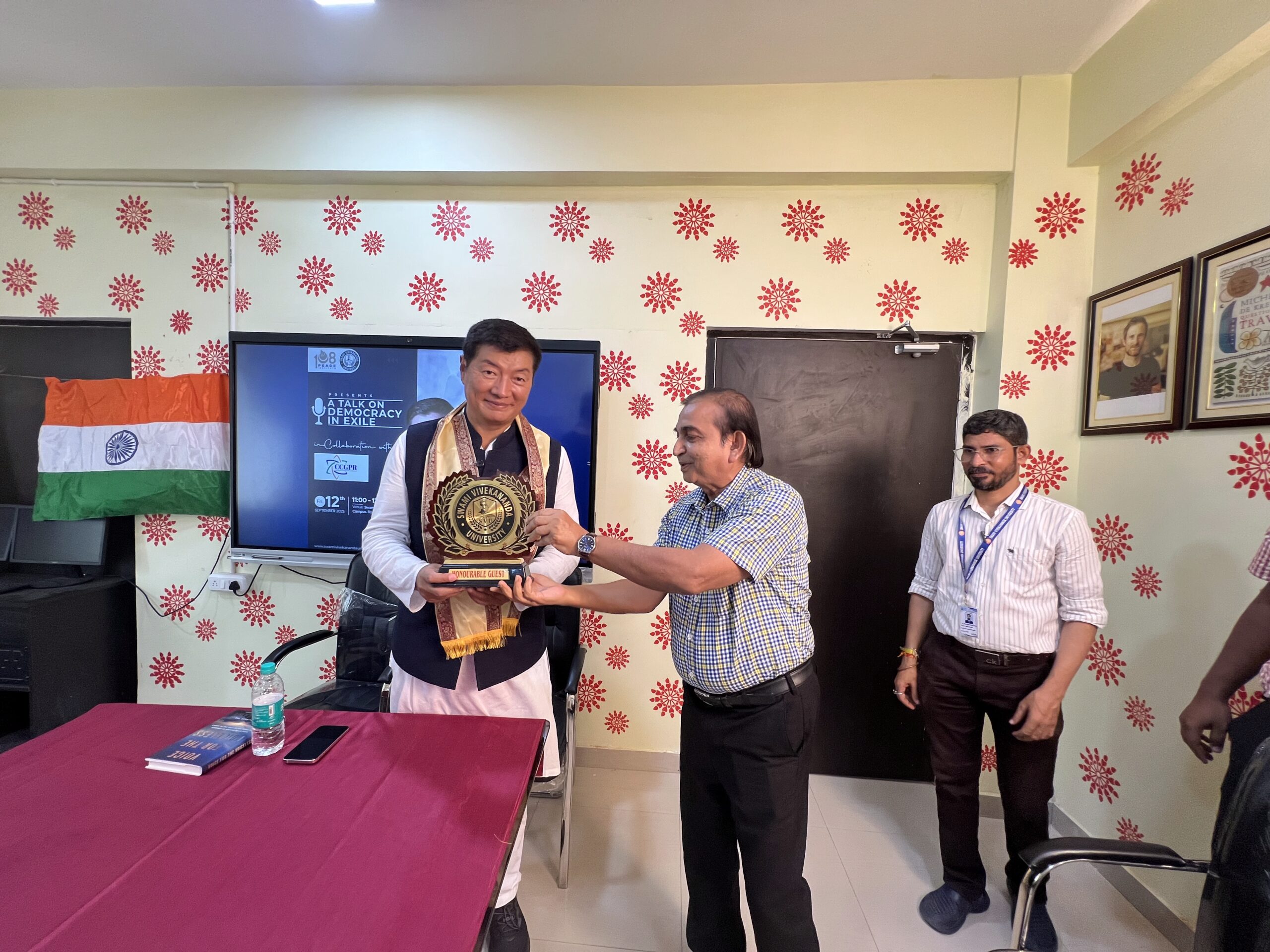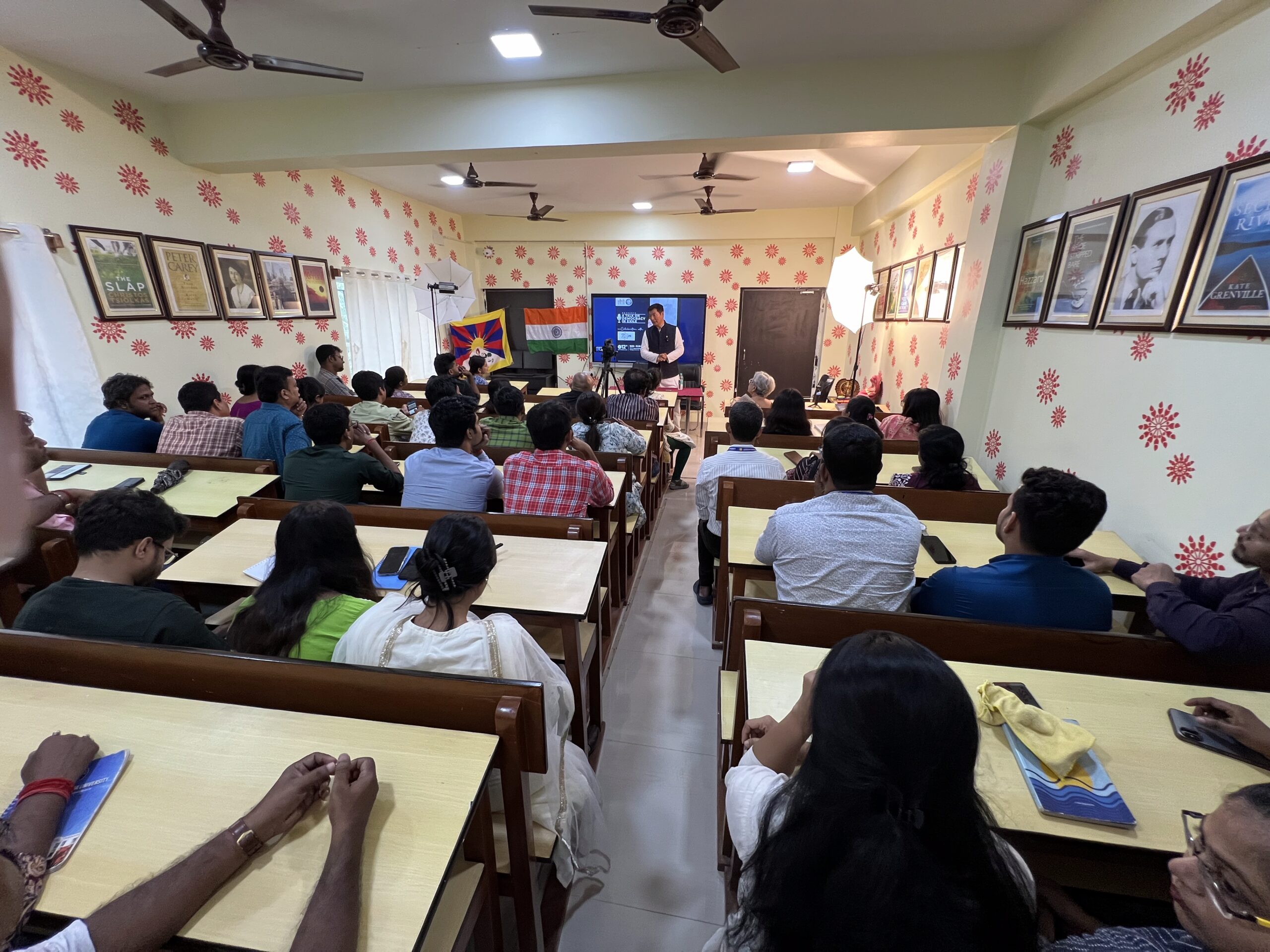On 12th September 2025, the 108 Peace Institute continued its lecture series in Kolkata, in collaboration with Swami Vivekananda University and the Centre for Global Policy and Research. The university proudly hosted an inspiring talk on “Democracy in Exile” by Dr. Lobsang Sangay. The session brought together faculty members from across departments, fostering a rich exchange of ideas and perspectives.
In his opening remarks, Dr. Sangay highlighted two historical accounts linking Tibet and Bengal. He shared Tibet’s gratitude to Bengal, recalling how Atisha Dipankar, a great scholar from Bengal, revived Buddhism in Tibet during the 11th century when the tradition was in decline. He also recounted how Rabindranath Tagore, fascinated by Buddhism and Tibet, established a program in Tibetan Studies at Visva-Bharati University. Tagore even invited the Italian Tibetologist Giuseppe Tucci and personally visited Kalimpong to engage with Tibetans, fostering deeper cultural understanding.
Dr. Sangay then turned to modern history, explaining how the Panchsheel Agreement of 1954 between India and China allowed the use of the Calcutta port, which inadvertently strengthened China’s position in Tibet. He reminded the audience that China not only occupied Tibet but also invaded India as far as Tezpur in Assam in 1962, using the same route. He further reflected on India’s goodwill, pointing out that it was the first country to recognize China at the UN, even when Western nations hesitated. Yet, India repeatedly faced betrayal—from the Doklam standoff soon after celebrating 60 years of diplomatic ties, to the 2020 Galwan Valley clash following the 70th anniversary celebrations, which left 20 Indian soldiers dead. He warned that India must remain cautious: “When India shakes hands with China, it must remember that China comes with a dagger in hand.”
Shifting focus to the heart of the lecture, Dr. Sangay described the resilience of the Tibetan exile community. After His Holiness the Dalai Lama and Tibetans settled in India, they rebuilt monasteries destroyed in Tibet, established schools and settlements, set up clinics, and formed the Central Tibetan Administration (CTA), their democratic government in exile. Today, Tibetans boast a literacy rate of 96%, thanks to India’s support in providing subsidized education. The CTA runs 13 offices worldwide, conducts regular presidential and parliamentary elections, and functions as one of the most effective exile governments globally, said the speaker. Dr. Sangay expressed pride that their model has even inspired other refugee communities seeking to establish self-governance.
Continuing his lecture, Dr. Sangay reflected on the global state of democracy. He noted that in the last 30 years, democracy has backslid, leaving more non-democratic countries than democratic ones. Ironically, during the same period, funding for democracy promotion rose from $2 billion to $10 billion annually, leading to a surge in democracy-focused organizations and consultants. Despite this investment, democracy continues to erode.
He challenged the conventional notion that democracy requires a state to exist, arguing that Tibet’s experience proves otherwise. Democracy in exile, he emphasized, plays a crucial role in shaping democratic practice when communities eventually return home. He gave historical examples: Lenin developed Bolshevik ideology in exile, Gandhi refined Ahimsa in exile before bringing it to India, and similar lessons apply today. “If you don’t learn democracy in exile, you will not bring democracy back home,” he stressed.
Dr. Sangay warned that while the world has succeeded in removing dictators, it often fails to replace them with true democratic leaders—allowing authoritarianism to resurface. Exile democracy, he argued, equips leaders with governance experience, from education and finance to running elections. He cited the example of Lech Wałęsa, who fought for democracy in Poland, won the Nobel Peace Prize, and became the country’s first democratic president. However, Wałęsa struggled with governance and, in a later election, received only one percent of the vote. This, Dr. Sangay noted, showed the importance of not only winning democracy but also learning how to govern it effectively.
In closing, Dr. Sangay emphasized that the story of Tibetan democracy in exile is also a story of India, expressing heartfelt gratitude to the people and government of India for their unwavering support. The insightful lecture concluded with an engaging interaction, as faculty members eagerly explored questions on Tibet’s future and the community’s resilience in preserving its culture amid adversity.

